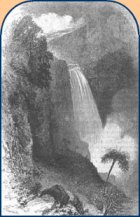
NINETEENTH-CENTURY CONTEXTS
Nineteenth-century Latin America was characterized by
revolution in many countries resulting in eventual liberation from
British and Spanish colonial powers, whose encroachments on native
Latin American life and territory stretched back several hundred years.
Books such as William H. Prescott's History of the Conquest of
Mexico and History of the Conquest of Peru (1843) in the Dickinson
library suggest that Emily Dickinson was aware of the early conquest
of the Americas, and allusions in her poetry reflect some knowledge
of colonized Latin America from the early 1500s through her own lifetime.
The periodicals that Emily Dickinson had access to frequently published
stories about conquest and exploration of exotic Latin American locations.
Periodicals and newspapers carried briefs detailing the current events—often
revolts, liberations, dictators, anarchy—in Latin America.
Early Conquest of Latin America
The following are excerpts from Prescott's History
of the Conquest of Peru (1843) and pictures from John Abbott's
"The Conquest of Mexico By Hernando Cortez" in Harper's New Monthly
Magazine, December 1855, vol XII, no. LXVII.
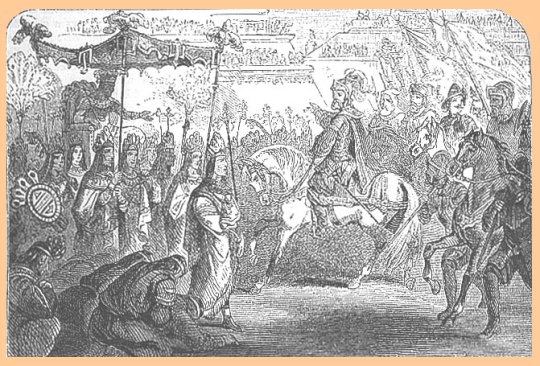
"The Peruvian chief was especially desirous of knowing whence and why Pizarro and his followers had come to these shores. The Spanish captain replied, that he was the vassal of a great prince, the greatest and most powerful in the world, and that he had come to this country to assert his master's lawful supremecy over it. He had further come to rescue the inhabitants from the darkness of unbelief in which they were now wandering"(870).
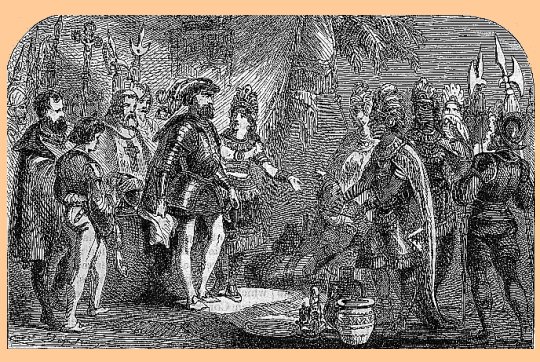
"The Indian prince listened with deep attention and apparent wonder; but answered nothing. ...It may be that he did not believe there was any other potentate on earth greater than Inca; none, at least, who had a better right to rule over his domininions. And it is very possible that he was not disposed to admit that the great luminary he worshipped was inferior to the God of the Spaniards. But whatever may have passed in the untutored mind of the barbarian, he did not give vent to it..."(870).
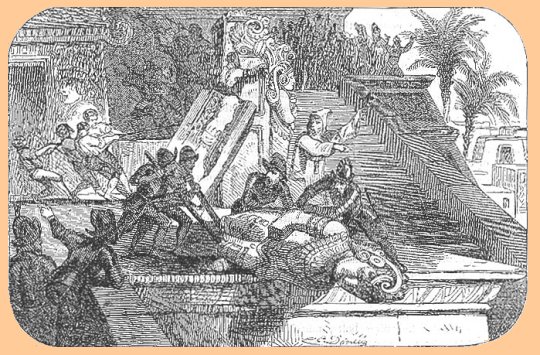
"But the most renowned of the Peruvian temples, the pride of the capital, and the wonder of the empire, was at Cuzco, where, under the munificence of successive sovereigns, it had become so enriched, that it received the name of Coricancha, or "the Place of Gold.".... The work was... so finely executed, that a Spaniard, who saw it in its glory, assures us, he could call to mind only two edifices in Spain, which, for their workmanship, were at all to be compared with it. Yet this substantial, and in some respects, magnificent structure, was thatched with straw!"(780).
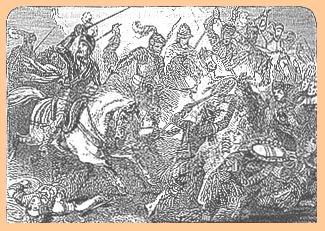
"Both parties then withdrew from the field, taking up their respective stations within bow-shot of each other, so that the voices of the warriors on either side could be distinctly heard in the stillness of the night. The Indians, exulting in their temporary triumph, looked with confidence to the morrow to complete it. The Spaniards, on the other hand, were proportionately discouraged. They were not prepared for this spirit of resistance in an enemy hitherto so tame. Several cavaliers had fallen; one of them by a blow from a Peruvian battle-axe, which clove his head to the chin, attesting to the power of the weapon, and of the arm that used it. .... Few either of the men or horses escaped without wounds, and the Indians suffered still more severely" (987).
